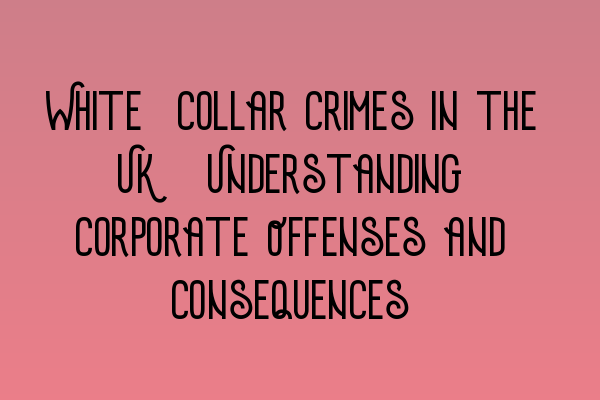White-Collar Crimes in the UK:
Understanding Corporate Offenses and Consequences
When it comes to criminal law, white-collar crimes refer to non-violent offenses committed by individuals or corporations for financial gain. These crimes typically involve fraud, bribery, money laundering, tax evasion, and other deceitful activities. In the UK, the legal system takes these offenses very seriously, and perpetrators can face severe consequences if found guilty.
Corporate white-collar crimes are particularly concerning as they involve business entities and affect the economy as a whole. It is essential for companies and individuals alike to understand these offenses and their implications. In this article, we will explore some common types of corporate white-collar crimes and the potential penalties associated with them.
1. Fraud:
Fraud is one of the most prevalent corporate white-collar crimes. It involves deceiving individuals or organizations for financial gain. Common forms of fraud include securities fraud, insurance fraud, identity theft, and mortgage fraud. Perpetrators often manipulate financial statements or engage in illegal activities to mislead investors, insurers, or lenders.
Being charged with fraud can have severe consequences, including hefty fines and imprisonment. It is crucial for corporations to have proper internal controls and processes in place to prevent fraudulent activities.
2. Bribery and Corruption:
Bribery and corruption involve offering, giving, receiving, or soliciting something of value to influence the actions or decisions of individuals in a position of power. It can involve public officials, corporate executives, or anyone involved in business transactions. Companies must have robust anti-bribery and corruption policies in place to prevent these offenses.
In the UK, the Bribery Act 2010 is the primary legislation for dealing with bribery and corruption. If convicted, individuals and companies can face substantial fines and imprisonment. Additionally, there may be severe damage to a company’s reputation and loss of public trust.
3. Money Laundering:
Money laundering is a process of concealing the origins of illegally obtained money and making it appear legitimate. It involves three stages: placement, layering, and integration. Individuals or corporations may engage in complex transactions or use various legal and illegal entities to disguise the illicit funds.
The consequences of being involved in money laundering are severe. In addition to large fines and imprisonment, individuals risk confiscation of assets or properties acquired through criminal activities. Companies may suffer reputational damage and loss of business opportunities.
To stay compliant with the law, businesses should establish anti-money laundering procedures and systems, conduct regular risk assessments, and train employees accordingly.
4. Tax Evasion:
Tax evasion refers to intentionally evading taxes by using illegal methods to reduce or avoid tax payments. It can involve hiding income, inflating deductions, or misrepresenting financial information to tax authorities. Both individuals and corporations can be charged with tax evasion.
Consequences for tax evasion can range from substantial penalties and fines to criminal prosecution, imprisonment, and seizure of assets. To avoid legal issues, it is essential for individuals and businesses to comply with tax laws and seek professional advice when needed.
Conclusion
Corporate white-collar crimes have significant implications on individuals, businesses, and the economy as a whole. Understanding the types of offenses and their consequences is vital in preventing and effectively addressing these crimes. By establishing robust internal controls, implementing proper compliance procedures, and staying up-to-date on relevant laws and regulations, companies can protect themselves against the risks associated with white-collar offenses.
For more information on legal exams and preparation, check out our related articles:
